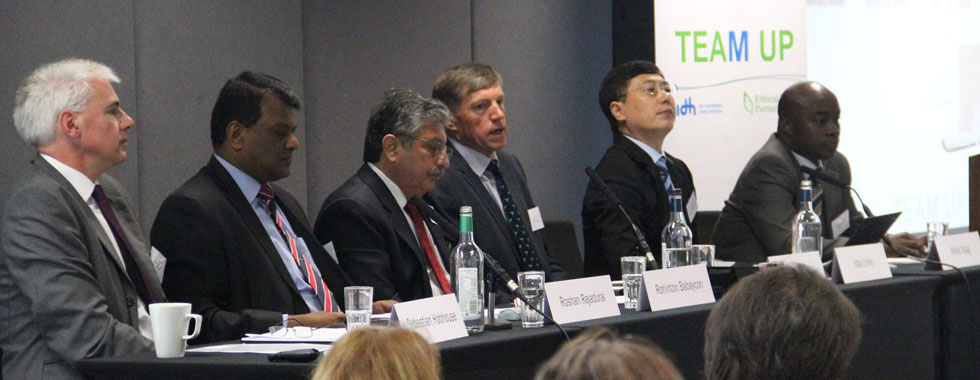Global tea producers meet in London
View(s):The Ethical Tea Partnership (ETP) and IDH – The Sustainable Trade Initiative hosted TEAM UP 2013 in London, bringing together over 100 delegates from across the tea supply chain to discuss the next level in tea sustainability.
The event, which welcomed professionals from producing regions, tea companies, retailers, and key NGOs and development organisations, provided a collaborative platform to evaluate the systemic changes required for a healthy tea sector, greater supply chain security, and a more socially and environmentally sustainable sector, a media release from the Planters Association said.

Picture shows from left - Sebastian Hobhouse, Chief Executive, PGI Group; Roshan Rajudurai, Ronnie Babaycon, Local Coordinator for Tea India on IDH’s Domestic Sustainable Tea Program; Mao Limin, General Manager, Senior Tea Taster, and a Board Director of Zhejiang Tea Group Co Ltd; and Alfred Njagi, General Manager of Operations, Kenya Tea Development Agency (KTDA).
TEAM UP 2013 is an expansion of ETP’s annual summer meeting and it was the first time tea producers from around the world had been invited to speak. Joining other distinguished guests’ on the ‘Producer Panel’ was the Managing Director of Kelani Valley and Talawakelle PLC, and Deputy Chairman of the Planters’ Association of Ceylon, Roshan Rajadurai.
The session was an opportunity for delegates to hear first-hand about sustainability initiatives from their respective regions, as well as challenges and opportunities facing the industry. Topics included climate change, wage structure, labour shortages, and pressures from growing domestic markets, alternative crops, and international standards.
“Together with his counterparts, Mr. Rajadurai agreed that climate change was the biggest issue facing the tea industry, which if unaddressed, would have serious ramifications for workers and smallholder farmers, since yields and leaf quality are inextricably linked to weather conditions,” the release said.
Asked about how declining workforces and labour shortages would impact the industry, Mr. Rajadurai said, “Sustainability of the industry is linked to the sustainability of workers,” making the point that everyone concerned with tea, both inside and outside the industry, has a role to play in improving wages. He added that it was also important to raise worker dignity and morale if the industry was to become more attractive to young workers.
Using his own experience as CEO of Kahawatte, he explained how this had been achieved by implementing an outgrower model that gives workers a real stake in the business (workers own the crop and the estate owns the land).
comments powered by Disqus

